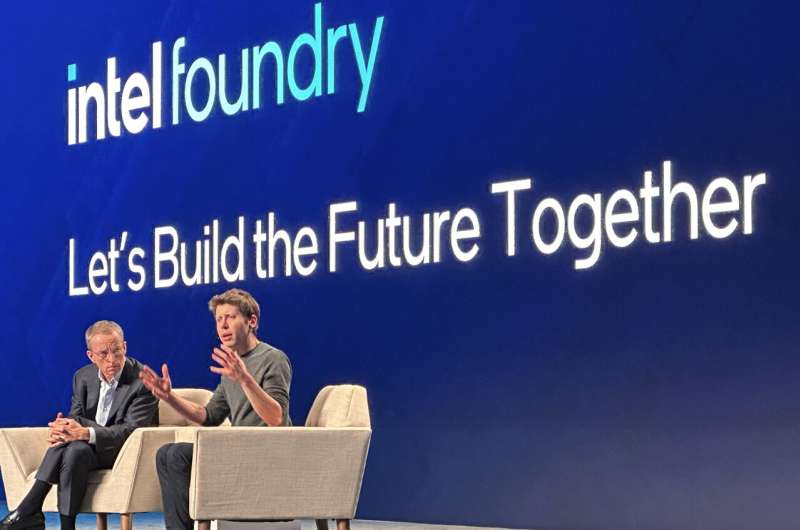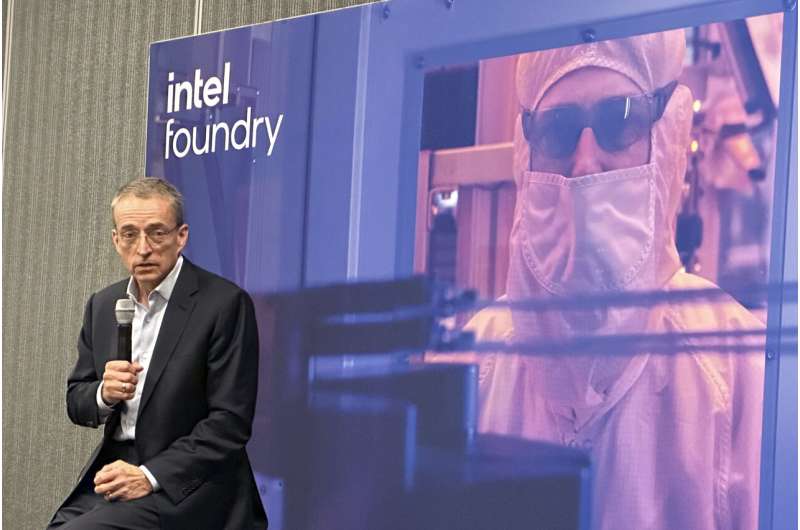
Two tech CEOs scrambling to produce more of the sophisticated chips needed for artificial intelligence met for a brainstorming session Wednesday while the booming market's early leader reported another quarter of eye-popping growth.
The on-stage conversation between Intel CEO Pat Gelsinger and OpenAI CEO Sam Altman unfolded in a San Jose, California, convention center a few hours after Nvidia disclosed its revenue for the November-January period nearly quadrupled from the previous year.
Intel, a Silicon Valley pioneer that has been struggling in recent years, laid out its plans for catching up to Nvidia during a daylong conference. Gelsinger kicked things off with a opening speech outlining how he envisions the feverish demand for AI-equipped chips revitalizing his company in a surge he dubbed the "Siliconomy."
"It's just magic the way these tiny chips are enabling the modern economic cycle we are in today," Gelsinger said.
OpenAI, a San Francisco startup backed by Microsoft, has become one of technology's brightest stars since unleashing its most popular AI innovation, ChatGPT, in late 2022. Altman is now eager to push the envelope even further while competing against Google and other companies such as Anthropic and Inflection AI. But the next leaps he wants to make will take far more processing power than what's currently available.
The imbalance between supply and the voracious appetite for AI chips explains why Altman is keenly interested in securing more money to help expand the industry's manufacturing capacity. During his talk with Gelsinger, he dodged a question about whether he is trying to raise as much as $7 trillion—more the combined market value of Microsoft and Apple—as was recently reported by The Wall Street Journal.
"The kernel of truth is we think the world is going to need a lot more (chips for) AI compute," Altman said. "That is going to require a global investment in a lot of stuff beyond what we are thinking of. We are not in a place where we have numbers yet."

Altman emphasized the importance of accelerating the AI momentum of the past year to advance a technology that he maintains will lead to a better future for humanity, although he acknowledged there will be downsides along the way.
"We are heading to a world where more content is going to be generated by AI than content generated by humans," Altman said. "This is not going to be only a good story, but it's going to be a net good story."
Perhaps no company is benefiting more from the AI gold rush now than Nvidia. The 31-year-old chipmaker has catapulted to the technological forefront because of its head start in making the graphics processing units, or GPUs, required to fuel popular AI products such as ChatGPT and Google's Gemini chatbot.
Over the past year, Nvidia has been a stunning streak of growth that has created more than $1.3 trillion in shareholder wealth in less than 14 months. That has turned it into the fifth most valuable U.S. publicly traded company behind only Microsoft, Apple, Amazon and Google's corporate parent, Alphabet Inc.
Intel, in contrast, has been trying to convince investors that Gelsinger has the Santa Clara, California, company on a comeback trail three years after he was hired as CEO.
© 2024 The Associated Press. All rights reserved. This material may not be published, broadcast, rewritten or redistributed without permission.
Citation: CEOs of OpenAI and Intel cite artificial intelligence's voracious appetite for processing power (2024, February 22) retrieved 22 February 2024 from https://techxplore.com/news/2024-02-ceos-openai-intel-cite-artificial.html
This document is subject to copyright. Apart from any fair dealing for the purpose of private study or research, no part may be reproduced without the written permission. The content is provided for information purposes only.
